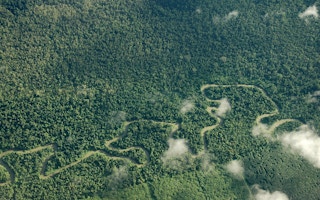Singapore bank DBS, Singapore Exchange (SGX), Standard Chartered and state investor Temasek Holdings said on Thursday that they are joining forces to develop a Singapore based global carbon exchange and marketplace for high-quality carbon credits.
To continue reading, subscribe to Eco‑Business.
There's something for everyone. We offer a range of subscription plans.
- Access our stories and receive our Insights Weekly newsletter with the free EB Member plan.
- Unlock unlimited access to our content and archive with EB Circle.
- Publish your content with EB Premium.
“There’s a degree of distrust in these markets as there’s a gray area around the verifiability of these projects,” Piyush Gupta, chief executive officer, DBS Bank said at a press conference. “On the other side, the opportunity is very real too. This is going to be a huge multi-billion dollars opportunity.”
The marketplace, known as Climate Impact X, will help mediate the limitations of low-carbon technologies, including renewable energy solutions, to drive down carbon emissions enough to hit goals under the 2015 Paris Climate Agreement to prevent global warming.
With more than 1,800 companies globally pledging to reach net zero emissions, the global demand for high-quality carbon credits in the voluntary carbon market is estimated to increase at least fifteenfold in the next decade to 2 billion tonnes in 2030. Climate experts have urged that offsets be used as a last resort.
“Asia’s priority, as is Singapore’s, must be to reduce carbon emissions through abatement efforts. But not all firms can turn off the emissions tap fast enough,” said Ravi Menon, managing director, Monetary Authority of Singapore.
The largest buyers are likely to be industries with hard-to-abate emissions, including steel, utilities and cement, Mikkel Larsen, interim CEO of Climate Impact X (CIX) and chief sustainability officer at DBS told journalists during a press conference.
“To get to net-zero, there’s just not enough scalable and economic technology apart from avoiding deforestation, reforesting, and other nature-based solutions,” reiterated Bill Winters, group chief executive, Standard Chartered. “There’s not enough out there for us to live within the budget that we’ve got for ourselves. And the consequences of not living within that budget, as we’ve all heard, and as we all know, are quite dire.”
The joint-venture is tasked to overcome the lack of transparency and ineffectiveness of some carbon projects that currently undermine the market. The carbon market is also fragmented with 64 carbon pricing initiatives implemented or scheduled for implementation, reckons the World Bank. Prices also vary considerably according to market. The United Kingdom carbon price hit US$71 before slipping 10 per cent yesterday in its post-Brexit emissions scheme. The EU emissions scheme hit a record high above US$67 last week.
“The concerns that have been expressed in this forum and elsewhere are legitimate. The questions have been questions about the way that carbon credits have been used … and about the underlying standards that have been applied,” said Winters.
CIX aims to overcome mistrust in the carbon offset market by leveraging satellite monitoring, machine learning and blockchain to enhance the transparency, integrity and quality of carbon credits. It will have the hard task of proving whether projects are effective in mopping up carbon dioxide.
Singapore is also relying on its brand as one of the world’s leading financial and trading hubs with stringent regulatory oversight to garner interest in its marketplace. The initiative will also be supported by the International Advisory Council, an independent expert body to guide offset project quality.
“If we’re able to harness the potential of nature-based solutions in Southeast Asia, we can move the needle on carbon sequestration efforts globally,” Menon said.
The CIX exchange and project marketplace will focus initially on natural climate solutions and is expected to be operational by the end of 2021, the joint venture told journalists.

















